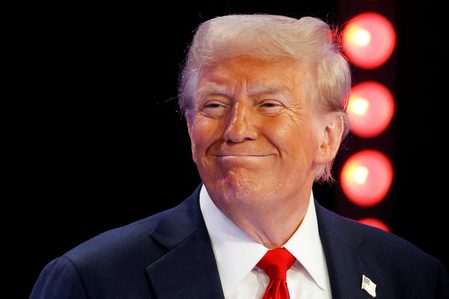[Edgewise] What Trump 2.0 bodes for West Philippine Sea and Filipino immigration to US
President-elect Donald Trump’s appointments for secretary of state, national security adviser, and immigration czar have repercussions on the West Philippine Sea and Filipino immigration to the United States.
With the appointment of Senator Marco Rubio as State Secretary, Washington’s support for the Philippines against China’s pugnacity in the South China Sea is not expected to change, despite Trump’s threat to disengage from foreign military commitments.
Rubio, a senator of Cuban descent, is a vocal critic of China’s behavior in the Indo-Pacific region and Beijing’s persecution of the Uyghur minority. Rubio also campaigned to restrict Chinese business operations in the US, like TikTok and Huawei.
He filed a bill to bolster US-Philippine security cooperation and also supports the transfer of nuclear technology to foreign allies to strengthen force projection against US adversaries.
Another anti-China stalwart is national security appointee Mike Waltz. A former Green Beret who served in the Pentagon under former president George W. Bush, he has called on the US to prepare for open military conflict with China in the Indo-Pacific region.
America First monkey wrench
Tension over Beijing’s territorial claims could rise to a new level of belligerence if Trump keeps his campaign promise to levy a 60% tariff on imports from China. However, considering the devastating impact of such a tariff on the US economy, Trump’s threat could just be bluster.
But his “America First” approach could throw a monkey wrench into the Philippines’ growing security ties in the region. Trump has depicted Japan and South Korea, friends of the Philippines on security issues, as “freeloaders” who must pay more for US military support or lose it. He also believes Taiwan should pay the US protection money.
By contrast, Rubio and Waltz share a traditional foreign policy approach which, in the case of China, is compatible with Trump’s anti-Beijing posture. However, that traditionalism bumps up against Trump’s radical isolationism that would “let Russia do whatever the hell it wants” and ask NATO to “pay more” or say goodbye to US membership.
Rubio and Waltz, nonetheless, are loyalists and are likely to scrounge for “workarounds” should Trump insist on his isolationist frame of mind.
Immigration crackdown
Trump’s incendiary campaign diatribes against 11 million undocumented immigrants will definitely morph into vigorous enforcement, posing a direct and palpable danger to immigrants, including some 300,000 Filipinos (a conservative estimate) who have no papers.
Trump’s appointee as immigration czar, Tom Homan, is a longtime anti-immigration hawk. He is among the authors of Project 2025, a far-right policy blueprint for Trump. He is best known for the first Trump term’s notorious policy of separating thousands of migrant children from parents facing charges of illegal entry. The children were sent alone to shelters without a plan for reunifying with their parents.
This time, Homan said he would deport nearly 4 million US citizen children together with their undocumented parents to avoid such separations.
Flanking Homan is anti-immigration extremist Stephen Miller, presumptive White House deputy chief of staff for policy. Miller, also a Project 2025 author, was a senior adviser and speechwriter during Trump’s first term. He played a key role in crafting Trump’s Muslim travel ban and family separation policy.
Workplace roundups
Homan told CBS News he would first hunt down criminals and potential terrorists for deportation. Next will be non-criminal undocumented migrants who have been ordered deported. He will bring back mass immigration roundups at workplaces, which Biden stopped in 2021.
Homan will enforce Trump’s other immigration promises. In the crosshairs is birthright citizenship, the automatic granting of children born in the US to undocumented aliens. Vigorous legal challenge is expected as this plan contradicts a long-held reading of a 19th century amendment to the U.S. Constitution.
Also tagged with a bullseye is Deferred Action for Childhood Arrivals (DACA), which allows children brought into the US by undocumented parents to stay and work. The program could now face drastic changes, even cancellation, affecting some 2,800 Filipinos it currently protects.
Bad signs for family sponsorship
Perhaps the Trump policy that will have the biggest impact on Filipinos is his intention to issue an executive order, on “Day One,” ending “chain migration,” a derogatory term favored by immigration opponents to describe the right of all US citizens to petition family members for permanent residency and eventual citizenship.
Petitioning family members is the engine of continued Filipino immigration to the United States where they now number more than 4.1 million. And 71% of Filipino immigrants who received a green card in the US In 2021 did so through family reunification.
To block this immigration channel, Trump mulls blocking all US citizens from sponsoring parents, siblings or adult children to settle in the US, a drastic change from current law. – Rappler.com
Rene Ciria Cruz is an editor at PositivelyFilipino.com. He edited the book A Time to Rise: Collective Memoirs of the Union of Democratic Filipinos (KDP), (UP Press), and was Inquirer.net’s US Bureau Chief 2013-2023. He has written for the San Francisco Examiner, San Francisco Chronicle, Pacific News Service, and California Lawyer Magazine.


